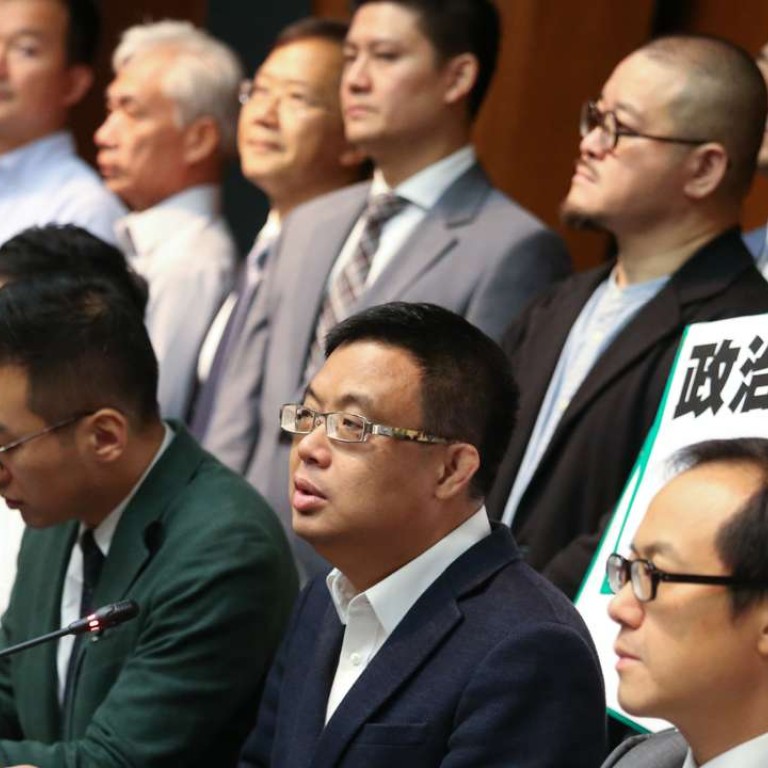
Inclusiveness might be more important than democracy in Hong Kong
‘For the first time since 1997, the Election Committee now has a real chance of picking the most appropriate candidate’
The pan-democrats’ coalition successfully captured an estimated 325 of the 1,200 seats on the 2017 Chief Executive Election Committee. This is 50 per cent more than their share five years ago. In terms of Hong Kong’s political development, it is an important milestone towards building public accountability in the political order.
In all past elections of the Chief Executive, the democratic opposition was politically irrelevant despite its considerable popular support. Its presence on the Chief Executive Election Committee was mere window-dressing.
For this reason, the coalition derided the political arrangement as a “small circle” election that was short on legitimacy because it failed to be accountable to a broader constituency, which they also dubbed “not genuine universal suffrage.”
But with its 325 seats, the coalition has approached a position of wielding effective power through exercising checks and balances in the politics of selecting the Chief Executive. It is now a power to be reckoned with.
It also represents a voice not only from the grassroots, but also from the learned and professional classes and those who will represent the future of Hong Kong’s higher value added service economy.
It is significant that these voters did not support candidates who stood for casting “blank votes” or radical positions. If this new force coalesces and is well led, it could eventually emerge as the new voice of democracy. And, unlike the old democratic forces, it comes from a part of the population who represent a growing share of Hong Kong’s future GDP.
Their participation in the Chief Executive Election Committee also has the potential of bringing popular legitimacy to a political institution that is increasingly perceived to be lacking it.
Justice Woo Kwok Hing, one of the candidates running to be the Chief Executive in 2017, has advocated expanding the constituency of the Chief Executive Election Committee from the current 246,000 to 1 million. His position is similar to the one advocated by the Group of 13 Scholars in April 2014 that called for broader representation of the Nominating Committee.
While universal suffrage is a moral ideal underpinning any democratic system of government, its effective operation still depends entirely upon other real practical features, of which “checks and balances” is a crucial element in ensuring accountability.
In their important book, Why Nations Fail, authors Daron Acemoglu and James Robinson deliberately shun the term “democracy” in favour of an “inclusive” political system. The defining feature of the latter is whether government is effectively and broadly accountable to the people, especially in a complex pluralistic society with diverse and conflicting interests.
In this reasoning, “genuine universal suffrage” is neither a necessary nor sufficient condition for an “inclusive” political system. Nor is it considered necessary to rotate political parties in power.
A working democratic political order must have three components. First, an autonomous functioning state supported by a meritocratic bureaucracy. Second, the rule of law. And third, accountability to constituents.
The main political difficulty in Hong Kong today is accountability –– but failure to make progress in one area will inevitably affect the other two areas as well.
Fresh demands to enhance the accountability of our political institutions have to convince not only stakeholders within Hong Kong, but also the Central Government in Beijing.
Is it possible China is more prepared to keep Hong Kong on a longer leash as the city’s relative importance in China’s economic calculus diminishes? If so, taking gradual steps to enhance the representativeness of our existing political institutions, without upsetting the basic architecture for improving accountability, could be the more acceptable approach.
Following this logic, broadening representation on the Chief Executive Election Committee (or the Nominating Committee in the future) and the Functional Constituencies in the Legislative Council should be seen as an improvement in public accountability rather than a hostile act.
A political change like this is desirable for Hong Kong because it will better reflect the massive shifts in the city’s economic and social landscape in the past three decades.
These shifts include the transformation from manufacturing to a service-based economy, the massive influx of migrants from mainland China (about 2 million people in 30 years), rising housing prices, and the division of society into “haves” and “have-nots”.
These changes require a major policy response from government, a reprioritisation of the public policy agenda, and effective leadership able to take decisions forward with the broad support of people from different constituencies.
For the first time since 1997, the Election Committee now has a real chance of picking the most appropriate candidate it deems best prepared to take Hong Kong forward and make progress in improving government accountability.
Richard Wong is the Philip Wong Kennedy Wong Professor in Political Economy at the University of Hong Kong

